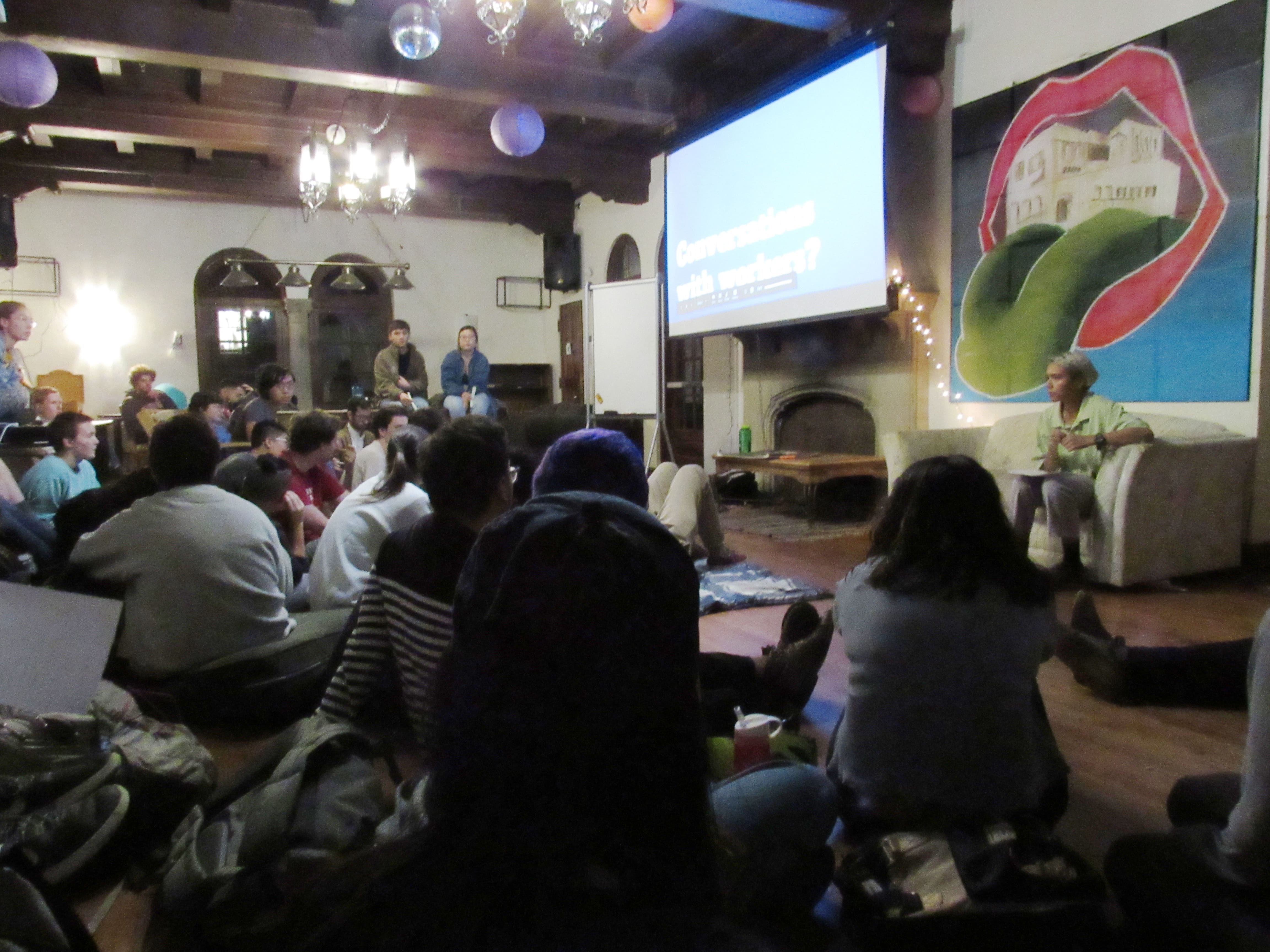On Tuesday night, the Campus Workers Coalition collaborated with the Service Employees International Union (SEIU) Local 2007 to host a teach-in. Students at the event were invited to discuss the history and current state of labor issues on campus.
In attendance was a cohort of about 50 Stanford students as well as professional labor organizer Johannes Raatz from SEIU Local 2007.
The event began with students raising concerns that they’d heard from campus workers. Quoting from testimonies written by Residential & Dining Enterprises (R&DE) employees, the students cited costs of living, housing prices and transportation challenges as some struggles Stanford workers deal with on a daily basis.
Students also read criticisms of R&DE from the testimonies, with issues like inadequate communication, stagnant wages and a precarious work environment raised.
“The work atmosphere makes it feel like my job is on the line,” one student said, reading from an R&DE worker’s testimony. Other criticisms included that managers give “average” reviews in workers’ performance evaluations.
According to R&DE spokesperson Jocelyn Breeland, the R&DE is bound by its collective bargaining agreement with SEIU Local 2007, which places restrictions on wages, benefits and other terms of employment.
“R&DE staff who are part of this bargaining unit receive comprehensive health insurance, retirement benefits and wages consistent with Stanford’s living wage program, with a built-in increase each year,” she wrote in an email to The Daily.
Event organizer Sefa Santos-Powell ’21 attributed unfavorable working conditions to capitalism broadly and gave the audience a brief history of the rise of capitalism — a system, she said, which relies on profitable but cheap labor.
According to Breeland, however, R&DE is not a for-profit corporation.
Next, Josh Cobler ’20 led a review of the history of labor movements in the United States and presented labor mistreatment at Stanford specifically, emphasizing the increasingly important role of student activism in addressing the latter.
Raatz also encouraged Stanford students to continue engaging in social activism. He shared a variety of methods of activism that students could use on campus and distributed a worksheet about motivating people to work for social change. Raatz also engaged audience members in a simulation of a employer-employee confrontation and encouraged coworkers to act on the grievances presented in the simulation.
Santos-Powell later commented that she would only consider the event a success if students not only promoted dialogue regarding labor issues on campus but also transformed that dialogue into action on behalf of campus workers, such as with regards to job security and better treatment.
Breeland said that R&DE is open to hearing workers’ concerns, citing monthly “summits” that occur between R&DE and the union as an opportunity for issues to be raised.
“We encourage the union to raise any concerns directly with Stanford Dining so that they can be addressed,” she wrote. “We also want to reassure our employees that they may raise concerns without fear of retaliation.”
Stanford Coalition for Planning an Equitable 2035 (SCoPE 2035) member Matt Nissen ’20 said he feels that R&DE could do more outreach to improve working conditions.
“It’s great that there is a continued focus on labor,” Nissen said. “I think [Stanford] could do more to help workers find housing in the area so their commute to school isn’t three, four hours long, and we as students should be eternally grateful for the effort and the value they create for the school.”
Christian Escalante ’19, co-chair of the Pilipino-American Student Union (PASU), attended the event to find opportunities to get involved in activism around labor rights.
“Hearing the workers’ stories and the different ways SEIU is working to help these workers was something I didn’t know about, so it was great to come and learn,” Escalante said.
Escalante added that the event’s large turnout spoke to “what’s happening on [Stanford’s] campus and shows that students care about workers rights.”
“It was uplifting seeing so many people turn out for this,” she said.
Daniel Yang contributed to this report.
Contact Sean Lee at seanklee ‘at’ stanford.edu. Contact Richard Coca at richcoca ‘at’ stanford.edu.
